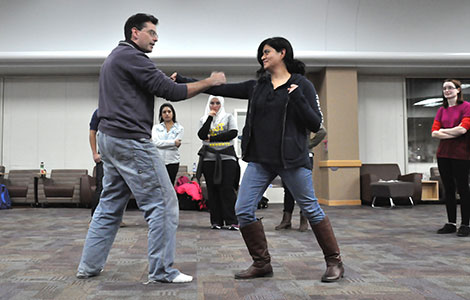Learn practical self-defense skills

Students participated in a self-defense class taught by Ed Glimme and sponsored by the Programs and Activities Council.
November 25, 2014
The Programs Activities Council held a series of self-defense courses at the South, Downtown and Truax campuses Nov. 8, 18, and 19.
Instructor Ed Glimme teaches many different groups his everyday martial arts and practical self-defense skills including state troopers. He talked about how he tries to teach people these courses in order to help them think through bad situations.
“What I am discovering is that people have a genuine concern about violence in the matter that it creates fear. They see what is on TV or what is on the internet and they hear a story,” said Glimme. “Where ever their fear lies, it’s not addressed at a local martial arts, karate, taekwondo or just a regular school. Really my point is how do I address people’s concerns and fears and how can we work from that scary place and kind of work a little deeper into it.”
The Programs Activities Council advisor, Susan Valtierra, explained why she thought this type of program was important for students to learn and be exposed to.
“I think that it’s just a good thing, good knowledge to possess,” said Valtierra. “It’s not like we have a lot of violence on campus or whatever, but it’s also just to be able to have that knowledge and its very simple and easy to learn, and I think that a lot people think ‘Oh just the females need to learn this,’ but I think it’s both ways, both male and female students or male and female people.”
Although previously sparsely attended, the event Nov. 19 at Truax drew quite the crowd.
Glimme explained how his approach to teaching was different than most and how that attracted more people looking for just everyday skills and techniques that they could apply to their own lives.
“Many schools are there just to teach a technique, you know this is how you punch, how you kick, this is how you grab people and throw them,” said Glimme. “I guess I’m a lot more concerned about people’s welfare since people have the concern. This is the method that I address it through.”
Throughout the course, with each new situation presented, Glimme reminded the class of his equation to getting out of bad situations. Relax, breathe, and then move. Although we are all very familiar with the fight or flight responses, Glimme said there is also a freeze response in which someone can’t move because they simply don’t know what to do in that situation. His equation helps people remove themselves from the emotional fear, take a deep breath to clear their mind and assess the problem, and then move to get themselves out of it.
Valtierra said that due to the positive feedback from students and the increase in attention the programs have gotten recently that there will be more coming in the future.
“I know that people who have gone through them previously said they learned something very quickly that will, you know, aid them for the rest of their life,” said Valtierra. “Now that the word is out and more students have expressed interest and once they start talking to their friends and we get it a little more on the promotion, definitely, we will bring him back, probably three times next semester.”






























